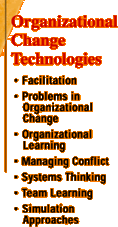 |
||||
 |
 |
|||
 |
||||
Effective groups are able to facilitate their own decision making and planning processes. Less effective groups initially require support from a neutral, external facilitator.
Why? There are a number of very important reasons why facilitation can be useful.
Overcoming Old Patterning
Everyday work and communication patterns create one of the greatest barriers to organizational effectiveness. Sometimes, old conflicts tend to lock people into old patterns. At other times groups suffer from "group think" where they are unable to break out of old thinking because of strong concensus around the way things have always been.
There is also the problem of mismanaged agreement, often known as the Abilene Paradox. (link to Abilene Paradox book)
In other situations, there is a tendency for more junior people to automatically defer to more seniro people in the organization. This does not always lead to good decisions being made.
An external facilitator can operate in a neutral way to help groups overcome internal conflicts, think and work in ways that open up new possibilities, and begin questioning their own assumptions.
Generating Commitment to Action
Facilitation is also useful for another reason.
Solutions provided by outsiders may not solve problems in your organization. This is because there are two elements to a successful strategy. First, you must have good planning.
Then, you must have good implementation. It seems to be a natural "problem" of human beings that they generally do not like to use ideas from somewhere else. People are much better at implementing their own ideas.
Given this state of affairs, rather than prepare consultancy reports that generally end up on the top shelf in a company, it is much better for an organization to generate its own living programmes. A living programme is one designed by the people who will ultimately be involved with it's implementation.
An external facilitator is able to help a group generate exciting, actionable plans. And, because these have been developed by the people who will iimplement them, the chances of success are much higher.